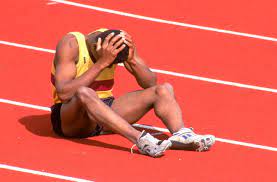The Negatives of Sport Specialization
A controversial topic in youth sports is specialization. Sports specialization can be defined as intensive year-round training in a single sport at the exclusion of other sports. Today, more than ever, young athletes feel pressured to choose their sport early on and then focus on that one sport entirely. With the advent of club teams, kids can play their sport year-round and subsequently, they get very little rest and are repeating sport-specific movements over and over again. The intense focus and competition produces star athletes, but studies show that year-round sports not only increases the risk of injury, but also places more stress, anxiety, and social pressure on the child.
A great example of the negative effects of specialization is Bruin basketball player Calvin Gustafson. Calvin has been playing basketball year-round since the 7th grade. Calvin has had back and knee issues for years and really struggled with the emotional aspect of sports his sophomore and junior year. When asked about all these injuries Calvin said, “Basketball has been great, but playing it all year long has had its consequences. I had a nagging back injury my sophomore year, but I felt like I had to keep playing to keep up with everyone else, so I didn’t take a break. I think that because I have played basketball year-round, I have gotten injured more and those injuries last way longer.” Calvin really struggled with injuries during high school and as a result, never reached his full potential.
Another problem with specialization is the emotional difficulties it can create. Some people don’t handle the pressure of sports as well as others and Calvin is no exception. When asked about the stress of playing basketball all year, he responded, “I was getting yelled at by my coaches and teammates for things I couldn’t control. I was really frustrated and this experience was awful. Basketball wasn’t fun anymore.” Sports can be very competitive and getting yelled at is part of the game however, getting yelled at every day, year in and year out by the same coaches and teammates can have an impact on your enjoyment of the game.
I am another example of the negative impacts of specialization. I love basketball and I have dreamed about playing in college. Thousands of boys have this same dream and so for the last eight years, I have been in a gym nearly everyday, lifting, shooting, practicing or playing games- all in pursuit of a spot on a roster. I focused solely on basketball early on because this was what I had to do in order to keep up with other players. I have been lucky enough to not have a major injury, but I have back and knee pain as a result of doing the same movements over and over and I am physically exhausted almost everyday. Playing the same sport all year has impacted me mentally as well. I put a lot of unnecessary pressure on myself to be perfect every time I step on the court and I feel like if I don’t play amazing every game, I am getting passed up. I am proud that I push myself to be the best I can be, but always being on edge takes the fun out of basketball sometimes. My experience has shown me that athletes should play a variety of sports and take significant breaks in the off-season. Sports should be fun; once that is no longer the case, what is the reason for playing?
The best solution to the specialization problem is to be a multi-sport athlete. Many feel that if you focus on multiple sports, you will never be great at any of them, but I have seen countless examples in my life of kids that excel at multiple sports. A perfect example of this is senior David Hair. David is a varsity starter in football, basketball, and tennis. David was asked how playing multiple sports has helped him as an athlete and he said, “Each sport increases my ability in the other sport. Football helps me be more physical on the basketball court, basketball has helped me with my footwork for all sports, and tennis helps me with hand-eye coordination.” I think that this is a huge benefit to playing multiple sports. You can become a true athlete that excels in all parts of the game in multiple sports. Different sports help you with different movements and coordination, so it is great to play lots of them. When asked about how playing multiple sports has limited injuries, David said, “Different sports use different muscle groups and playing different sports give muscles a break.”
Another athlete at Mountain View that excels in multiple sports is Abe Stafford. Abe participates in wrestling, basketball, soccer, and track. According to Abe, “Playing multiple sports has helped me as a person because it challenges me to do more. For instance, I had to learn how to manage my time and work hard because I would have basketball practice then wrestling practice.” Playing multiple sports can be really hard sometimes because it fills your schedule, but it can teach you valuable life lessons like time management and hard work. Playing multiple sports can be very rewarding as you have many teammates and can have lots of great relationships. When asked what the best thing about playing multiple sports is, Abe said, “The best thing about being a multi-sport athlete to me is the fact that you always have something to do. I am always busy and so I can’t waste my time.” For people that like to be productive with their time, playing multiple sports is great. You can always be working on getting better for each sport and you can make a lot of new friends because you are on multiple teams.
Specialization has become a huge problem in youth sports. Injuries that rarely affected kids in the past are becoming more and more common. Young athletes are seeing an increase in stress and more and more pressure is being put on them to be the best. A great solution to this new problem is to try playing multiple sports. Being a multi-sport athlete can help you improve as an athlete and give different muscle groups that are used in one sport a break. You can meet lots of new people and playing multiple sports will push you to be the best athlete you can be.






